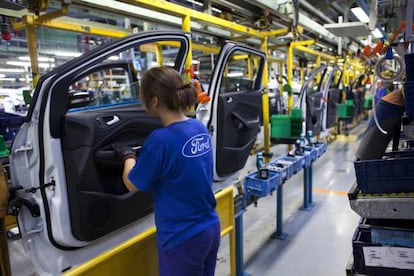Mexico overtakes Brazil as top car manufacturer in Latin America
Free trade agreements are encouraging a number of brands to open new assembly plants


Asian and European car brands are investing heavily in Mexican-based assembly plants, catapulting the country’s auto industry to unknown heights.
A few days ago, Mexico became Latin America’s leading car maker, ahead of Brazil. In the first half of 2014, the country’s plants produced 1.59 million automobiles, a 7.4-percent rise from the same period in 2013. Meanwhile, Brazil’s production in the first six months of this year fell back to 1.57 million units.
The National Association of Motor Vehicles of Brazil (Anfavea) has admitted that the 16.8-percent drop in car production is due to lower sales in the Brazilian market. Eduardo Solís, president of the Mexican Automotive Industry Association (AMIA), is skeptical about the likelihood that this trend will keep up to year’s end, but he is keen to showcase the benefits of the Mexican automobile sector.
“Ninety-five percent of what Brazil is making gets sold in its own market, and only five percent gets exported,” he says. “The Mexican case is just the opposite: 83 percent of what we manufacture gets exported and we have significant growth.”
The reasons for this growth come as no surprise. The last four years have witnessed the opening of six new assembly plants in Mexico. Brands such as Audi, Mazda, Honda, Mercedes Benz, Nissan-Renault and BMW have found the right conditions, and invested around a billion dollars each. The location is viewed as an opportunity for consolidation in the American continent: Mexico is the second-largest vehicle exporter to the United States. In 2013, of the nearly three million cars that were assembled in Mexico, around 70 percent crossed the northern border into the neighboring country.
One of the keys to this brisk export business is the fact that the 1994 North America Free Trade Agreement (NAFTA) eliminated tariffs on automobile trade between Mexico, the US and Canada. Solís admits that Mexico’s trade agreements with over 40 countries are a key element in attracting brands that want to set up new assembly plants.
Mexico’s trade agreements with over 40 countries are a key element in attracting car brands
Other factors that companies take into consideration include geographical location, a strong presence of component suppliers, a skilled workforce and a government that keeps the economy stable, said the head of AMIA.
“Deciding to build a plant in Mexico was extremely easy,” said Harald Krüger, member of the board of BMW, during the announcement in early July that the brand will open a new plant in San Luis Potosí. “Mexico has a vibrant economy and a solid industrial foundation. It has a solid, well-established network of suppliers. It has a highly motivated and qualified workforce.”
Mexico has over 1,100 companies that make car components, employing 1.7 million people.
Meanwhile, Japan’s Mazda opened a plant in the state of Guanajuato in January, and is planning to make around 230,000 vehicles by 2016. Solís views Mazda as evidence that the Mexican auto industry is going through a golden era in which investments keep pouring in, surpassing all forecasts.
His association estimates that by late 2014 Mexico will have manufactured 3.1 million automobiles, beating last year’s record of 2.9 million, and that this figure will reach four million by 2017, when today’s investments begin to yield results.
Tu suscripción se está usando en otro dispositivo
¿Quieres añadir otro usuario a tu suscripción?
Si continúas leyendo en este dispositivo, no se podrá leer en el otro.
FlechaTu suscripción se está usando en otro dispositivo y solo puedes acceder a EL PAÍS desde un dispositivo a la vez.
Si quieres compartir tu cuenta, cambia tu suscripción a la modalidad Premium, así podrás añadir otro usuario. Cada uno accederá con su propia cuenta de email, lo que os permitirá personalizar vuestra experiencia en EL PAÍS.
En el caso de no saber quién está usando tu cuenta, te recomendamos cambiar tu contraseña aquí.
Si decides continuar compartiendo tu cuenta, este mensaje se mostrará en tu dispositivo y en el de la otra persona que está usando tu cuenta de forma indefinida, afectando a tu experiencia de lectura. Puedes consultar aquí los términos y condiciones de la suscripción digital.








































